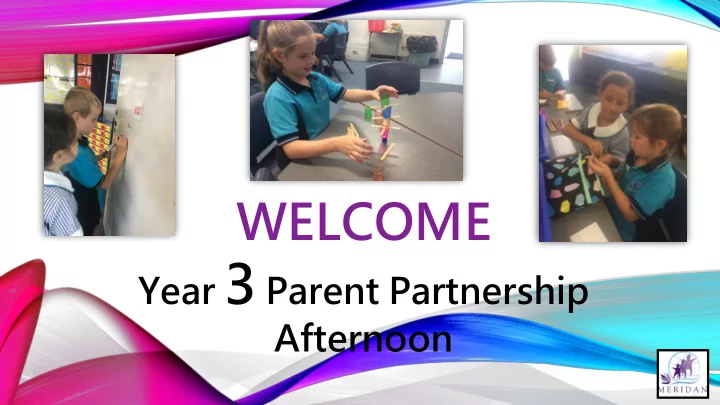

WELCOME Year 3 Parent Partnership Afternoon
CLASSROOM INSTRUCTION READING Key strategies include: • Teacher directed guided reading lessons – Explicit teaching • Modelled, Shared, Independent, Collaborative, Reciprocal Reading • Reading Detective and Comprehension Strategies • Flexible grouping • Reading to children for enjoyment • Reading Stamina • Small groups formed for a specific purpose • Use of ICT devices to support literacy • Student/Teacher conferences • Setting goals and success criteria
CLASSROOM INSTRUCTION READING
HOME READING Home reading is meant to be EASY and ENJOYABLE. Home reading books go home with homework and are be changed weekly The Reading Log on the Homework sheet needs to be filled in regularly and SIGNED. Children will be encouraged to become more independent as the year progresses with changing their books and monitoring what books they are reading.
Primary School Priorities P-3 WHAT DOES A NUMERACY BLOCK LOOK LIKE IN OUR CLASS? Maths Warm up Explicit teaching Focus Small group teaching/practising Reflection
CLASSROOM INSTRUCTION NUMERACY Maths Masters • Maths Boost • Fluency Focus •
LEARNING GOALS LITERACY AND NUMERACY
CRITICAL AND CREATIVE THINKING IN THE CLASSROOM Differentiation – Planning for Differentiation Feedback – To support learning Critical Thinking Frameworks are used across curriculum areas to frame thinking. Critical Thinking – Explicitly taught in all KLAs Critical thinking is at the core of most intellectual activity that involves students learning to recognise or develop an argument, use evidence in support of that argument, draw reasoned conclusions, and use information to solve problems. Creative thinking involves students learning to generate and apply new ideas in specific contexts, seeing existing situations in a new way, identifying alternative explanations, and seeing or making new links that generate a positive outcome.
STUDENT ENGAGEMENT AND WELLBEING Weekly Behaviour Lessons 3. Student udent Engagement gagement Recognising positive student achievements on assembly Student Behaviour – Explicit Behaviour Lessons and Circle Time Circle Time Lessons School wide behaviour rewards
HOMEWORK • Consists of nightly reading, spelling and maths practice and a weekly task • Sent home Friday, back Thursday • Students will complete the weekly homework sheet and one weekly choice task • Each week two students will take a class scrapbook home focussing on a • Topic being studied in class
SUPPORTING YOUR CHILD’S LEARNING Keep an eye out on Any questions- see your school website for child’s teacher parent workshop times Working with students on homework- discuss new concepts, model and work together on both literacy and numeracy
REMINDERS 3ET- Tuesday: Music, Drama Wednesday: PE Friday: Technology even weeks, Library 3JB- Tuesday: Music, Drama Wednesday: PE Thursday: Library Friday: Technology odd weeks PROTOCOLS - Students without a parent in the morning to go to Under Covered Area - If you arrive before 2:45pm to pick students up, please wait away from windows as this can be very distracting to students when teaching is still being carried out - No playing on playgrounds before and after school
EXCURSIONS AND EVENTS Term 3 Term 1 • Parent Interviews • Setting expectations and routines • Learning Celebration- Multiplication • Parent Interviews Game Fair • Incursion- Starlab • Reading Blitz • World Deaf Day Celebration Term 2 Term 4 • NAPLAN Between 12 th – 22 nd May • Written reports • Excursion – Queensland Art Gallery in • Written Reports Brisbane • Market Day • Swimming program • Year 3 Art Celebration
NAPLAN NAPLAN Testing occurs for Year 3 between 12 th – 22 nd May • Reading • Writing • Language Conventions • Numeracy If you have any concerns about your child’s participation in NAPLAN testing please discuss with the class teacher.
Thank-you and welcome to your class community
Recommend
More recommend